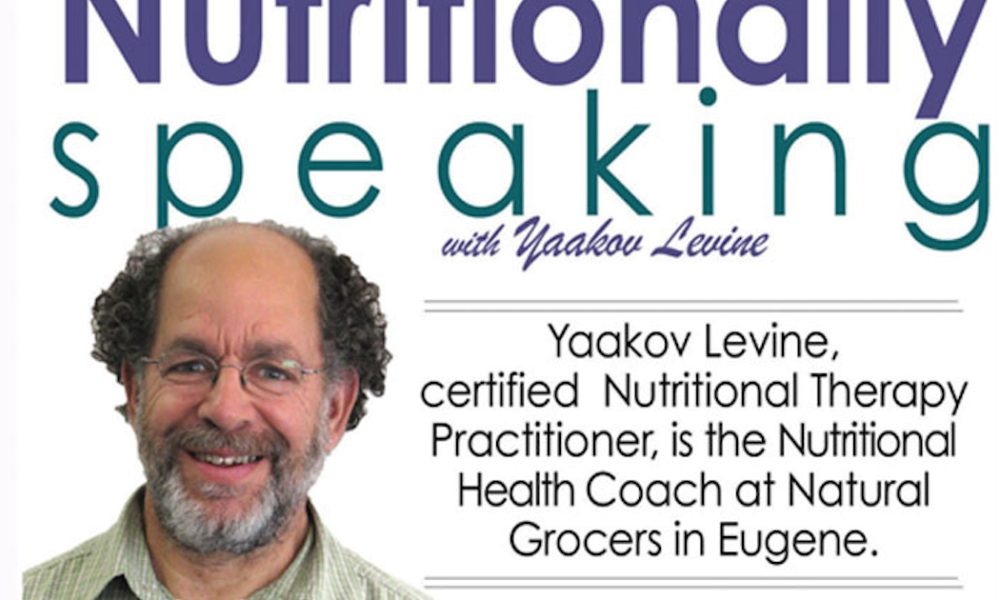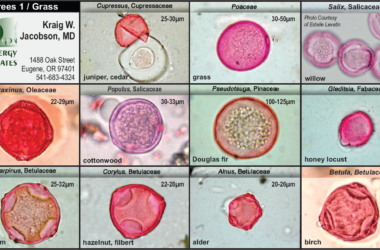
We have been (some of us at least) enjoying the hot, sunny weather. Hopefully wearing our UV protecting sunglasses, using adequate (non-toxic) sunscreen and having fun; whether through gardening, bike riding or more in the sun, enjoying another wonderful Willamette Valley summer. It’s also time to look again at how we can protect our eyes, skin, and even our brain, with an important nutrient called lutein.
Not protecting your eyes from the ravages of omnipresent blue light can lead to damage to the macula region of the retina, causing central vision blindness or macular degeneration. Macular degeneration is a medical condition predominantly found in elderly adults, in which the center of the inner lining of the eye – known as the macula area of the retina – suffers thinning, atrophy and, in some cases, bleeding. The bleeding causes scar tissue that can result in loss of central vision, causing the inability to see fine details, read or recognize faces. According to the American Academy of Ophthalmology, it is the leading cause of central vision loss (blindness) in the United States today for those over the age of fifty years, which is not ”elderly” by any means. We do not, however, need to leave the house to be exposed to damaging light sources. Blue light is ever present in our lives, from the sun, computer monitors, flat screen TV’s, tablets and smartphones. We are also exposed to blue light from all types of ”energy efficient” fluorescent, LED and halogen lighting.
The Age-Related Eye Disease Study (AREDS) – sponsored by the Federal government’s National Eye Institute – has found that food and supplement sources of specific antioxidants (protective nutrients) and zinc can reduce the risk of developing advanced age-related macular degeneration (AMD) by about 25 percent. Studies have suggested that people who have diets rich in green, leafy vegetables have a lower risk of developing AMD. These foods supply the carotenoids lutein and zeaxanthin, which form a protective light filter over the macula of the eye: sunblock for your retina. Along with green leafy vegetables, red and yellow bell peppers, egg yolks, squash, mango, papaya and corn supply these important nutrients. Another antioxidant found in grape skins and red wine called resveratrol is also being studied as an important part of our preventative arsenal. The studies are looking at the possibility that the resveratrol will slow down the proliferation of the abnormal blood vessel growth in the macula region of the retina. Another protective nutrient, Glutathione has been studied for its protective role in eye health. Studies show the amino acid NAC, as well as the herbs milk thistle and turmeric, when taken as a nutritional supplement will support our bodies production of glutathione.
Since lutein and the other protective carotenoids are fat soluble, a diet rich in healthy fats (such as grass-fed butter, olive oil, and coconut oil), along with healthy fat digestion and assimilation is imperative. Studies show that there is a correlation between those who have had gallbladder surgery and AMD later in life. (My mother had her gallbladder removed many years before being diagnosed with AMD.) Our gallbladders store bile produced in the liver, which is released when we ingest fats. The bile then helps in the digestion of the fats. We also see a higher incidence of AMD with people who have little or no fat in their diets. In this case the bile stored in the gallbladder becomes thick and does not flow out when needed to support fat digestion. A moderate amount of healthy fats such as meat (pasture raised), fish oil, olive oil and butter in the diet will assure we will be able to digest, as well as assimilate the important antioxidants and other nutrients to protect our eyes. For a snack, try an avocado or a handful of raw nuts or seeds – all are great sources of healthy fats to maintain your body’s protective antioxidant level.
Studies have found that when lutein levels are low in the eye’s macula, there is a corresponding low level of lutein in the brain, contributing to reduced cognition and short term memory issues. Lutein is the dominant protective carotenoid in the brain, also supporting brain development in infants and toddlers, as well as an important component to protect skin from the aging damage from exposure to UV light. Lutein is available as a one a day supplement, and studies show a dosage of 10-20mg. per day will supplement the lutein in your diet.
As we age, we often do not produce a sufficient amount of Hydrochloric Acid (HCl) in our stomachs to digest proteins, and protect us from bacterial or fungal overgrowths. The HCl we produce also plays a critical role in our absorption of minerals such as calcium, magnesium and zinc. As stated above, the National Eye Institute’s study confirmed that zinc is a very important nutrient along with lutein and resveratrol for preventing AMD. Now is the time to protect your eyes with the same diligence you do for your skin when you head out for summer fun.







